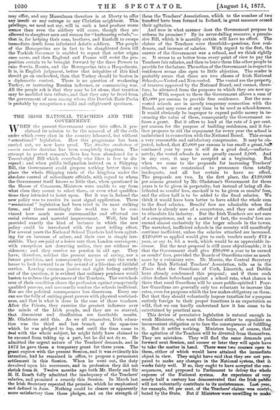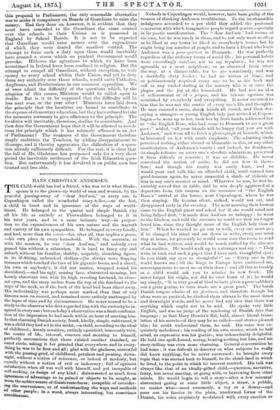THE IRISH NATIONAL TEACHERS- AND THE GOVERNMENT.
WHEN the present Government came into office, it pro- claimed its mission to be the removal of all the evils under which every class in the country laboured, but without "sensational" legislation. How this programme has been carried out, we now have proof. The Sanitas sanitatunz et onznia sanitas doctrine has been completely forgotten. The attempt to protect seamen's lives has been abandoned for a Tenant-right Bill which everybody who likes is free to dis- regard ; and when public indignation insisted on a Shipping Bill, the Government could propose nothing better than to place the whole Shipping trade of the kingdom under the absolute control of subordinate officials, with regard to whom the-Government itself knows so little that, when questioned in the House of Commons, Ministers were unable to say from what class they meant to select them, or even what qualifica- tions they intended to insist upon. But it was in Ireland the new policy was to receive its most signal application. There "sensational" legislation had been tried in its most striking form, and there accordingly the world was to be con- vinced how much more statesmanlike and effectual are social reforms and material improvement. Well, fate had provided exactly the kind of instance in which the new policy could be introduced with the most telling effect. For several years the National School Teachers had been agitat- ing for an increase of salary, and their case is simply irre- sistible. They are paid at a lower rate than London scavengers; with exceptions not deserving notice, they are without re- sidences; and they receive no pension in old age. They have, therefore, neither the present means of saving, nor a future provition, and consequently they have only the work- house to look forward to as the reward of a lift-time of faithful service. Leaving common justice and right feeling entirely out of the question, it is evident that ordinary prudence would hasten to redress the grievances of the Teachers. The wretched- ness of their condition closes the profession against competently qualified persons, and necessarily renders the schools inefficient. Nor are the political consequences less disastrous, Every one ern see the folly of uniting great powers with physical 'wretched- ness, and that it what is done in the case of those teachers. After the Priests, they exercise the greatest influence over the minds of the Irish people, and they are so starved, that discontent and disaffection are inevitable results. Mr. Gladstone Said this. As we all remember, Irish educa- tion was the third and last branch of the upas-tree which he was pledged to lop, and until the time came to deal with the whole subject, he might fairly have claimed to be excused from taking up a part, but he did not do so. He admitted the urgent nature of the Teachers' demands, and in 1872 he gave them a temporary grant for three years. The grant( expires with the present Session, and it was evidently his intention, had he remained in office, to propose a permanent settlement in this Session. When he went out, the duty devolved upon his successors, and in profession they did not shrink from it: Twelve months ago both Mr. Hardy and Sir M. H. Beach fully admitted the inadequacy of the Teachers' salaries, and promised a remedy this Session. In March last the Irish Secretary repeated the promise, which he emphasized and defined in June. Nothing could be clearer or apparently more satisfactory than these pledges, and on the strength of diem the TeachersrAssociations, wEch to the number of two Itundre-d-have-been fenned in- Ireland, in great-measure ceased their agitation. And now in what runner- does the Government propose to redeem- its promisest By its never-failing resource, a permis- sive Bill, which ibis morally certain will have no effect. The claims of the Teachers were threefold--pensions, free resi- dences, and increase of salaries. With regard to the first, the answer of the Government was a refusal, and we think rightly so. It seems to us better from every-point of view to- pay the Teachers fair salaries, and then to leave them like other people to provide for the future. Theattion of the Government in respect to residences seems also open to little objeetion. The reader is probably aware that there are two classes of Irish National Schools,—Vested and Non-vested. The vested are the propetty" of trestees approved by the National Board, and cannot, there- fore, be alienated frau the purposes to which they are now ap- plied. With respect to these the Government allows a sum of £5,000' per annum to provide free residences. But the non- vested schools are in merely temporary connection with the Board, and may cease at any time to be need as school-hcruset. It would- obviously be improper to expend public money hi in- creasing the value of these, consequently the Government re- fuses a grant. But it offers to lend at the rate of 5 per cent. per annum for the purpose of building residences, and it far- ther proposes to aid the repayment for every year the school is maintained in connection with the National Board. This seems a very reasonable and satisfactory compromise. It may be ob- jected, indeed, that £5,000 per annum is too small a grant,but continued year by year it wilt de a pod deal,—unfortu- nately, the vested schools do not greatly exceed 2,000. And in any case, it may be accepted as a beginning. But when we come to the proposals for increasing Teachers' salaries, we are constrained to pronounce them totally inadequate, and all but certain to have ' no effect. The proposals are two. In the first place, the L120',000 per annum granted by Mr. Gladstone's Government for three years is to be given in perpetuity, bat instead of being all dis- tributed as results' fees, one-half is to be given as results' fees, and the other half is to be added to the fixed salaries. We think it would have been better to have added the whole stun to the fixed salaries. Results' fees are admirable when the teacher is already sure of a competence, and they are offered to stimulate his industry. But the Irish Teachers are not sure of a competence, and as a matter of fact, the results' fees are earned almost exclusively by the larger schools in the towns. The wretched, inefficient schools in the country will manifestly continue inefficient, unless the salaries attached are increased. £120,000 so applied would give to each teacher nearly £12 a year, or say 4s. 6d. a week, which would be an appreciable in- crease. But the next proposal is stilt more objectionable; it is that the Government shall give £6'0,000 a year to be earned as results' fees, provided the Boards of -Guardians raise as much more by a voluntary rate. Mr. Mervin, the Central Secretary of the Irish National Teachers' Association, tells us in tlie Times that the Guardians of' Cork, Limerick, and Dublin have already coecleumed this propo-sal; and if three such cities declare beforehand against- a school rate, what chance is there that rural Guardians will be more public-spirited ? Poor- law Guardians are generally only too reluctant to increase the rates, even for purposes which the law makes obligatory on them. But that they should voluntarily impose taxation for a purpose entirely foreign to their proper functions is- an expectation so wild, that we can hardly understand how it has come to be entertained by practical men.
This device of permissive legislation is natural enough in weak Ministers, who want the boldness- either to repudiate an inconvenient obligation or to face the consequences of fnifilling it. But it settles nothing. Ministers hope, of course, that the agitation of the Teachers will he diverted from themselves. They are mistaken. They will find the same demands put forward next Session, and sooner or later they will again have to take the matter in hand. There were-two courses open to them, either of which would- have- attained the immediate object in view. They might have-mid-that they TM not pre- pared to make any changes in the National 'system, that it works fairly well. If so, they ought to have accepted the con- sequences, and proposed to Parliament to- defray the whole expense of the National system. An experience of very nearly half a century hoe demonstrated that the Irish-public will not voluntarily contribute to its maintenance. Last-year, for example, 86 per cent, of the Teachers' claims-was contri-,?, buted by the State. But if Ministent-were-nnwilTmg to -make thinProPosal to Parliament, the only reasonable alternative was to make it compulsory on Boards of Guardians to raise the money. Had they done so, however, it is evident that they must have conceded to the Guardians the same control over the schools in their Unions as is possessed in England by School Boards. It is not to be expected that Guardians would raise money over the expenditure of which they were denied the smallest control. The attempt to force such a duty upon them would inevitably have aroused a storm which no prudent Government would provoke. Hitherto the agitations to which we have been accustomed in Ireland have been confined to religion. But the attempt to compel all Guardians, without exception, to vote ,money to every school within their Union, and yet to deny them any authority over those schools, would unite Catholics, Anglicans, and Presbyterians in one common opposition. We at once admit the difficulty of the questions which, by the adoption of this course, Ministers would be called upon to decide. But is it to be supposed that the difficulty will be less next year or- the year after ? Ministers have laid down the principle that the localities are bound to contribute to the expense of elementary education, but they have refused to take -the measures necessary to give efficiency to the principle. The localities will inevitably, therefore, decline to contribute. And then does the Government hope that it will be allowed to recede from the principle which it has solemnly affirmed in an Act of Parliament ? The weakness of the Government therefore simply embitters the Teachers, by adding disappointment to ill-usage, and it thereby aggravates the difficulties of a ques- tion already sidfleiently difficult. For the rest, it is clear that the fall of Mr. Gladstone has postponed only for a very short period the inevitable settlement of the Irish Education ques- tion. But unfortunately it has devolved it on public men less /trusted and less able.































 Previous page
Previous page